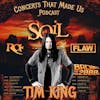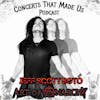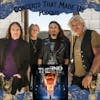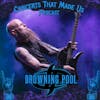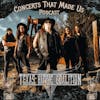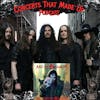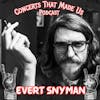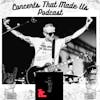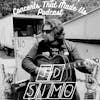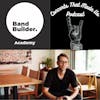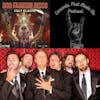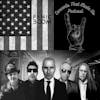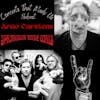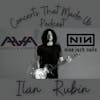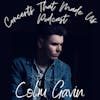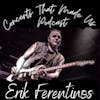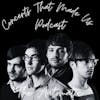🎸 Dive into the Darker Tones of RRRAGS new double album "Mundi" 🎧
In this captivating podcast episode, Brian engages in an insightful conversation with Ron Van Herpen from RRRAGS about his band's highly anticipated double album, "Mundi." As the interview unfolds, they delve deep into the album's intriguing darker tone, exploring the inspiration behind its creation and the band's decision to embark on the ambitious endeavor of a double album.
Ron passionately shares the band's meticulous recording process, revealing the challenges they faced and the creative choices they made to bring their vision to life. The conversation takes a nostalgic turn as they reflect on the band's formation and their remarkable journey as musicians, reminiscing about the pivotal moments that shaped their musical careers.
With genuine enthusiasm, Ron recounts his earliest musical memories, recounting the transformative moment that ignited his unwavering desire to pursue a career in music. As the discussion progresses, they delve into the vast array of musical influences that have shaped Ron's unique sound, offering listeners a glimpse into the diverse tapestry of inspiration that fuels his creativity.
The conversation takes an exciting turn as they exchange stories of their most memorable concert experiences, sharing the electrifying energy and indescribable connection that can only be experienced in a live performance. Ron also reveals the intriguing rituals and traditions that the band members engage in before taking the stage, providing a fascinating glimpse into the behind-the-scenes world of RRRAGS.
In a heartfelt moment, they discuss the band's engagement with their loyal listeners and followers, emphasizing the importance of building a genuine connection with their audience. They share their favorite musicians from history, paying homage to the legendary artists who have left an indelible mark on their musical journey.
Throughout the interview, a shared love for music permeates the conversation, as both Ron and Brian express their unwavering passion for the art form and the profound joy it brings them. Listeners are left inspired and eager to dive into the captivating world of RRRAGS and their mesmerizing double album, "Mundi."
Find RRRAGS here:
https://www.rrragsrock.com/
https://www.facebook.com/rrragspower
https://www.instagram.com/rrrags/
Find CTMU here:
https://linktr.ee/Concertsthatmadeus
Newsletter: https://concertsthatmadeus.aweb.page/p/f065707b-2e34-4268-8e73-94f12bd2e938
If you would like to support the show you can do so by rating/reviewing us on Itunes and Spotify or by signing up at https://www.patreon.com/Concertsthatmadeus
Save 10% on Band Builder Academy membership by following this link https://bandbuilderacademy.com/Brian_Concerts/join and using promo code "concerts" at signup.
Become a member at https://plus.acast.com/s/concerts-that-made-us.
Hosted on Acast. See acast.com/privacy for more information.
Brian (00:00:00) - Ron, welcome to Concerts That Made Us
Ron (00:00:03) - I'm very happy to be here. I'm very honored.
Brian (00:00:07) - It's great to have you know, I'm looking forward to diving into your music over the next bit. So you guys released your new double album, Mundi on the 15th of September. What can you tell us about it?
Ron (00:00:18) - A sermon. It's an album we start working on. Think 18 months ago, maybe 20. I'm not sure about that. And that took quite a while to finish it because we had a lot of material. And. We decided to put our music in a more experimental direction, so we added some krautrock elements to it. And also we wanted the music. A bit more heavier than our previous reps. And I think if you asked me, we did a pretty good job. I'm happy with the album.
Brian (00:00:57) - You sure did. You sure did. Now, the first thing that's noticeable once you listen is it's darker than your previous work. What kind of led to that decision?
Ron (00:01:09) - Well, we I always when I speak for myself, I always like when not every album from a bad song to say.
Ron (00:01:20) - And our second album was kind of the usual follow up from the first record, and I'm still love those two previous albums still getting wrong, but. We thought a third album could use some more balls to it. And some more courage in our musical approach. And that's why we decided not to take it. The. Not used to safe roads. No doubt the safe way. And yeah, and that's how we end up like this. So we had some different approaches when it comes to songwriting. No, not conventional way of writing songs like Bridge Chorus. Decided to mix it all up. And also, you know. Think outside the box when it comes to musical theory kind of thing, you know? Fucked skills and things like that, you know?
Brian (00:02:24) - Yeah. Yeah. Gotcha. Gotcha. And, you know, a double album, it's a big undertaking was a kind of a case of you had wrote too many songs or was it a conscious decision from the start that was going to be a double album?
Ron (00:02:37) - No, it was not a conscious decision.
Ron (00:02:40) - We went. We started writing and we had some some chilled out pretty long. And also we had some shorter songs, but when you put it together, we thought like, Hey, we put this on one record, it's never going to fit. So we had the idea just to split it up, you know, to make two different pieces. We thought, Nah, that's very good, A double. It's a good statement, you know. Of our previous albums were pretty short, around 30 minutes. And this one looks about, I think, 73 or something. 80. Yeah. So, uh, yeah, we thought it was a statement to do it like this, you know, put it in people's faces. Here you go. Did two albums, so like that.
Brian (00:03:31) - And, uh, you know, are you going to take a break now? Because you've put out practically two albums as one. Does that mean you guys are going to take a longer break?
Ron (00:03:41) - Well, first we got to promote his album the next year, and after that we'll see what happens.
Ron (00:03:48) - Maybe we'll be able to take a break. We have so much new ideas that we start with a fourth album. I don't know. Who knows?
Brian (00:03:57) - And when it came to recording then, how did you guys approach it? What did that time look like?
Ron (00:04:03) - Most a lot of material we recorded live in the studio and then we take the best take. And sometimes you have to repair something and that's and sometimes add some guitars or some proper bass player is very good at that space sounds psychedelic, stuff like that. And we added that stuff to the life track. And then put focus on it. Yeah, so we do it and also some live gems on the album, which just are the way we played it.
Brian (00:04:43) - I got you. I got you. Some of my listeners enjoy hearing about is when it comes to making new music, what's your favorite part? What do you look forward to most? And then the reverse. What do you dread?
Ron (00:04:56) - Well, for me personally, I like to see it when you have a musical.
Ron (00:05:02) - Did you see? That idea is starting to grow, you know. There are some tracks on the album which the basic idea comes from, and I gave her my hand and it was kind of a usual song, you know, with, uh, with uh, with uh, with a chorus and a bridge, you know, in reverse. And then we start that hustling around that. It's very interesting when you see what the end result of a certain song. And sometimes I think it's pretty difficult to see our service and how so is developing into something you. But in this product's process from this album, it was very exciting. And also, to me, you know, a wake up call like like, oh, this is also a way to do it, you know, and. Yeah, it was. It was exciting. This is really, really cool. Maybe we put some bugs or lights someday. Then you can see what out is. Starting version some some some songs was. Now it is right now.
Ron (00:06:14) - That's in a couple of cases. Totally different.
Brian (00:06:21) - That's something you'll definitely have to do. So. And, you know, it's been out for a week, so. There's not been much time for people to really get their teeth into it. But what has the initial reaction been?
Ron (00:06:34) - Well, until now, the reactions are pretty good. If you have a couple of years now and you're very positive and new reviews are coming up and we did our, uh, album presentation last weekend and yeah, that really was a blast. We sold a lot of records and people were very enthusiastic about new material. So we were very happy because it's always, you know, you never know how people are going to react, especially when you make a record which is so different than your previous work. You know, it can go both ways, you know, and some people like more soul related material. They probably end up with previous records. But the people who are more into experimental and krautrock space rock kind of stuff, they might end up with the next record.
Ron (00:07:28) - So yeah, it's quite, quite exciting.
Brian (00:07:32) - Yeah, Yeah, it sounds, it sounds us now. You guys formed in 2017 personally for you. What has the journey been like?
Ron (00:07:44) - Well, uh, we. You know that our drummer name is Rob, and the bass player also called Rob. My name is Rob. So there are the three R's from. So make it easier to make, say, the drummer This Rob and the bass player is called Zim. Okay. It makes it easier. So the bass players, Tim and I, we we met each other a long time ago, I think. 16 years old. And we are from the same city. And we hung out at at the same places. And eventually we ended up together in a bed. And I think it was 21 or something. Was it bad because. And that band evolved into Sonic, which is a band. Which which lasted from. 1999 till 2016. It still exists. But if you're going to do something with a pet, I don't know.
Ron (00:08:47) - But Rob and I lived together in a lady and that's how I started to know Rob offers him as a musician. And later on, I met a Rock Martin, the singer and drummer from, uh, from Rex. And he was a big Astro Sonic fan. So we meet a this place maybe, you know, a pity. So floating around here is not. It's not under us anymore. And on the body, its beauty. Uh, Rob, uh, started the conversation with me at actually didn't know that I was an. So he was quite surprised. That was in advance. What are you planning on Stalling. Oh, I'm such a great fan. That's. That's the way I met Rourke return. So. And a couple years later, we decided to. Yeah. To a former band and try some jam sessions together. And Walter from Rogan, he found out that we did it and immediately of his father, Rupert. So it was quite a challenge to, uh, to make an album for Burn because really after work.
Brian (00:10:03) - I suppose, at this stage. So we'll dive into your own musical history to give the listeners a sense of where you come from. Now it's a bit of a tricky one, but can you remember your earliest musical memory?
Ron (00:10:16) - Well, my earliest memories, my parents, they had a pharmacy shop, but they weren't exactly music lovers. The only records they had. Were they getting from clients? So they were like those awful combination wrecked, you know, all 13 good with disco tracks on it. Nana was scary and and Ross things like that. Also so awful a Dutch artists, you know. But a world record was the Osmonds with a track called Crazy Horses. Me and my brother. We really liked that because there was a rustle. That was my first. A culture which brought music. And when Kiss had a hit on 97, 1979, which was long. That was for me. Then I was really into rock music because for my birthday I get a lot of good records. From that point.
Ron (00:11:28) - Here. All hell was breaking loose for me is still one of my top five best rock albums.
Brian (00:11:38) - So it's a good one. It's a good one.
Ron (00:11:40) - And off the dirt a rainbow came with Rising. Because a girl who worked in my parents shop. She recorded the cassette. No cassette tape. And Rainbow Rising was on day one, the first cyber maiden. And Jimi Hendrix, that Gypsy. So that tape was also very important. And still all those records are very precious to me. And after that came the first vanillin. And that was. Like a bomb went off in my hair. You know, when you're running with the devil for the first time for me, I didn't know what was happening. Still think that guitar riffs one of the best riffs ever made.
Brian (00:12:28) - Yeah.
Ron (00:12:29) - So that's where the journey started and from that point started Also Discover more. Types of music. I also at that time listened secretly to disco music because that was not done for a metalhead but eventually end up with Slayer and Exodus, Nuclear Assault and Metal Church, all those thrash bands from the 80s, which also are very precious to me.
Ron (00:12:58) - Also Entombed Death Metal came. But also just go really big. No Rogers fan, but also some country music.
Ron (00:13:09) - And.
Ron (00:13:10) - Psychedelic music like the old Pink Floyd. Yeah, it was an interesting type.
Brian (00:13:16) - Yeah, sounds it sounds a very eclectic mix there. And yeah, you know, if you had to pick the moment to define what sparked the desire to become a musician, what would you say is.
Ron (00:13:29) - You know, when you have to kiss a life tour and you fall over, open that album cover. What do you see? You see a big stage with flames rising to yet and Ace Frehley is there on the right side of the stage. I was thinking. I want.
Ron (00:13:50) - That.
Ron (00:13:53) - And I also. Nine years old, I guess. And that was the age that I said to my parents, I want to play guitar. A third added the first thing they thought was. He's going to play this for one month and then we have to buy a nail so we can nail it to the wall.
Ron (00:14:14) - But. My dad never needed that deal because from that point on, I was playing guitar all the time and try to write my own songs. And actually there was 15 when when I and the cousin of mine. Media asked me to join his band. And that was a trash band called Death. And I was. When was 15 years old. And I was. Barely 16, when I had my first studio experience, which was like I was so overwhelmed from the whole studio thing, Big Table. And that's how I forgot to play. Well. So were you in a demo like, I mean, the song, so a pretty decent playing was off because there was so impressed was happening. So that was pretty fun.
Brian (00:15:12) - Oh, man, that's a that's fairly young, though, to have a studio experience, isn't it?
Ron (00:15:17) - Yeah, I was I was pretty ill.
Brian (00:15:20) - Growing up then the local music scene, What was it like and how has it changed to the way it is today?
Ron (00:15:27) - Okay.
Ron (00:15:28) - That is an interesting question because I'm from a small town called Oz and I still live live there. And we are quite a very living metal scene. Back in the days we had a 4 or 5 thrash bands who did pretty well in the 80s. You are deafened and played in. We got Mr. Who also made a pretty good name. We had endangered species. We at Armageddon probably forget Sundance, but we were friends, but we also were a healthy form of competition. So we had a great time playing with each other. Also, we try to overrule the other banjo in a friendly way, but. It was a great time. It was really for me. I learned so much. I learned so much. You know how to act on stage. To play on stage. It was really important. For me to to form myself as a musician.
Ron (00:16:37) - Yeah. Yeah.
Brian (00:16:38) - And how does that time compared to the local music scene today? How has this evolved over time?
Ron (00:16:44) - Well, I think a big difference.
Ron (00:16:49) - Quit that period. And now then it's. More difficult to to build a. You know, back in the days. When a band was playing in your city. You were to see that? Yeah. No matter what it was, you. You went there. So it was always growing. Always. When we played, there were two other people. There at least. So people really wanted to see bands. The music scene, live music scene was really. Active and the music is still active. But it's not that. It's not that on every concert. A lot of people are showing up, you know, and it's because there are a lot of work bands existing right now than there were back in the days because in my city, the the band scene was very really, very active, but it was not like that other cities. So I think also quite unique back in the time back in the days. I think that's that's a big difference. But also, you have you know, you have all digital social media and stuff.
Ron (00:18:03) - You have Spotify. They're going to go to. Very sweet. We are selling cassette tapes. No, it's really, really different.
Brian (00:18:13) - Yeah. Yeah, that's for sure. That's for sure. And from the concerts you've attended, then, is there any that you would say have made you?
Ron (00:18:23) - Well, my first big concert was Metallica, which was 98. It was the Justice Roll tour. I was a big Metallica fan. In a big right. I think the first for Greece. Right. I think the brilliant. Sometimes they have discussions with musicians because they think they're cheesy. Some of your listeners, we will chat, but I love it. So Winter and weddings, right for me was absolutely brilliant. They were fantastic. And Metallica showed up and. It was a bit disappointing for me because in my opinion, Queen's right. Cool. Brilliantly blowed Metallica from stage.
Ron (00:19:14) - Right.
Ron (00:19:16) - I'd still like to consider what it was like being there. South was messy. I mean, they played a bit sloppy, in my opinion, and Chris Wright was very tight and it was my first big concert, so it was very impressive to see 30,000, you know, big audience.
Ron (00:19:35) - And it was my first time I was 16. And in the city here. I saw Slayer on the Side of Heaven tour. In a in a city nearby. And think there will force 4000 people showing up to support a much smaller venue. But that concert was so intense. The energy from the from the public energy from the stage, it was most one of the most intense concerts I ever saw. It was absolutely amazing. And I think those two are still. The Becker fire.
Brian (00:20:16) - Yeah, I can see why. All right. I have to ask if you stack them together, which one comes out on top Slayer or Metallica and Queensryche?
Ron (00:20:25) - Oh, that's very difficult. I. I would say to we or or maybe maybe they think that that energy was so, so amazing. And the band was playing so tight and they were at their peak. Maybe, maybe because I was too young to source their on the store what they played at night 85 and total. The Dynamo High was 14, you know.
Ron (00:21:03) - So it was to you maybe there were at the peak back then, but but for me, they were at that was my the best Slayer concert I ever saw. And sort of many times, maybe 15 times or something, really.
Brian (00:21:20) - That is the last that.
Ron (00:21:21) - One was so, so 4000 met. Everybody was shouting the lyrics from Southampton. Everybody. No exception. Everybody. And that's quite impressive when you're 16 years old.
Brian (00:21:34) - Yeah, yeah, that's for sure. Yeah. Now, quite possibly the most important question of the whole episode for your shores. For any listeners that haven't caught them, give them the full experience, if you can tell us all about them.
Ron (00:21:50) - Well, we we going at the show that shows that this moments are more psychedelic with more parts in it. And we try to take the audience. On our knee and we try to do that with. No musical influence takes the overhead and we try to make a good balance between songs. Uh, experimental parts. Big, heavy first parts and psychedelic swinging parts where the audience can dance or trip out or anything you want.
Ron (00:22:37) - Everything is allowed except violence. And people can make their own journey together with us. I think that's what we try to accomplish with our audience.
Brian (00:22:49) - Yeah, sounds like a good night. And if you think of all the gigs you've played over your career, is there one that maybe sticks in your mind as the most perfect experience you've had?
Ron (00:23:01) - Well, there is one gig where it's going to show it's very special. And it was during the Covid time, you know. And everything was restricted. No, the whole story. A lot of bands were struggling with this whole corona Covid. Pretty shitty situation. And then there was in Antwerp in Belgium. They made a reader made out of wood, and we played there. And we had a state which was moving around in circles. And it almost seems like that Max movie. You. No, Max, Max and the other dog.
Ron (00:23:51) - Yeah.
Ron (00:23:53) - And when I walked into the arena, it was looking like that. Oh, my God. Play in the max from the Joker.
Ron (00:24:01) - So. And they had a pretty clever solution to this whole Covid, uh, you know, limitations because they had this kind of record kind of boxes where two pieces each take place. So when we looked around, you know, we saw this arena, the box with two purses in every niche. Maybe that's the right word. And then we started playing and yet was there was so great we had the stage was turning around that we'd shop with us. And the sound was perfect. It's also when you fold over our album cover, you see that arena on the east side. So the gig was so special that we decided to give it the place. When her album cover. The latest album. So I think that one was really. You're very special. We were pretty on steam that he was. So the show was also very, very good and everything fell into place.
Ron (00:25:09) - Yeah.
Brian (00:25:09) - You know, when you have a gig like that, how are you not like walking off the stage saying that was it? We can't possibly get any better.
Brian (00:25:17) - We might as well retire.
Ron (00:25:21) - Well, we went off station and we were really like, Whoa, this one was really, really great. But for me personally, I realised afterwards, maybe a couple of months later, man, that gig was really special. You know what? I think you always have to try to get over your best kick.
Ron (00:25:46) - No.
Ron (00:25:48) - When Dick is so special, he always looking for kicks that are even more special or. At least that same level, you know?
Ron (00:25:58) - Yeah.
Brian (00:25:59) - Yeah, true, true.
Ron (00:26:00) - So, you know, and sometimes we also play the gig in a very small venue in Nijmegen and it was on this second Christmas Day. In Poland and that world was also very great. There was only 50 people because it was so small, but the connection to the ropes were really great. There was only 50 people there. Everybody was having a great time. Also that. Small places can also vary. Very exciting. And very special.
Ron (00:26:30) - Yeah, true. It's true actually.
Ron (00:26:32) - Was for me your. Our. Most special for me. Hopefully with a new album and a new new set with our new material. Hopefully we can get some kicks that are going to top those two.
Ron (00:26:51) - Exactly.
Brian (00:26:51) - Exactly. Fingers crossed. And I always say you have to. You have to take the good with the bad. So for this one, though, you can use any band. Any. Any band you've been in for your career. But is there a gig that you've played that is maybe the worst experience you've had and how did you deal with it?
Ron (00:27:10) - Are there.
Ron (00:27:15) - Well, I think one gig was very bad. And I'm sorry for people who were there because there were also where people thought it was really great. But that was a gig with a lot. Maybe Noah was in that van, too, for five years. And it was on a festival in Sweden. And it was called Moscow Rock. And we played two times. And the first time we played there. That was really awful because we we would have two days and and half to bank was was off the band was drunk so we went up stage and you know fellows who are forgetting their parts and just saying that that gig was really bad and especially with a death blow because almost every gig of that was very, very good.
Ron (00:28:18) - Except for that.
Brian (00:28:19) - Yeah.
Ron (00:28:20) - Yeah.
Ron (00:28:21) - That one. Yeah. Very bad. Just strangely enough, after the show, we had some discussions backstage. Were pretty angry on each other. But one hour after that, we still had a good part. So that's a strange thing about that. Then it's all, okay, we get it. We forgive each other and let's have a good time. That show was really awful. And also we can remember one show with a band called Title and wasn't that bad. From 1995 till 1998. And that's also where we are. We were drunk and most of the time when the musicians are drunk. Nothing good from comes from that. These don't remember your parts. You also had a central station was put on the drum riser. So the drummer started playing and sampler was he was sampler was fucked up because of vibrations. And it always was one big mess. And that kind of gets you really want to forget.
Ron (00:29:30) - Yeah. Yeah. So I.
Ron (00:29:32) - Think every musician, this experience.
Ron (00:29:35) - Is like.
Ron (00:29:36) - Especially when you play for a long time.
Brian (00:29:39) - Yeah, I think you have to have experiences like that. It makes you a better musician almost.
Ron (00:29:44) - Yeah, totally. Because from that, gigs also you learn from that, you know, because you, you can never be on full steam or X, you know, and. And sometimes you have a lesser evening there. It happens with no robots. So. And I think what when there are musicians under the listeners. I am 100% sure that they can recognize all the things I'm telling right now.
Brian (00:30:14) - Yeah, definitely.
Ron (00:30:15) - Absolutely. Sure.
Ron (00:30:16) - Maybe some of them saw one of those gigs. Maybe they were a musical. Maybe some listeners who are. Wouldn't have any mistakes. I apologize. For that, but we had a great party afterwards.
Brian (00:30:29) - So that's the main thing. That's the main thing. And you know what your your shows nowadays with regs when it comes to your team, your pre-show and portion rituals, how do you psych yourself up and then afterwards, how do you win them?
Ron (00:30:46) - Yeah, that's also a good question with Rex.
Ron (00:30:50) - We we we all have our different. Method to get. Energize before a concert. Through me personally, I always am nervous. I make music for such a long time now, and I'm always nervous before a show. No matter how people are, there are the 4 or 5. I'm always nervous. So I always try to, you know, get a little bit of a quiet spot, you know, sit in a dressing room. Sorry. Dressing room. Not too much noise. You know, normally when I when a sort of friends of mine, I'll watch a couple of songs, maybe 3 or 4, but then I go backstage, get some rest. Change clothes, you know, because we have stage closing thing. Our drummer. He always does some voicing exercises and he also try to. To get a quiet place, sometimes get some sleep before he gets on stage. And see more bass player. He socializes a little bit. You know, with the people in the crowd, he's a bit different.
Ron (00:32:08) - And sometimes he he looks for a quiet spot. It's with him. It's a little bit different. So we have our own approach when it comes to that. It also differs from different rock bands band because they have what that is blood ritual. Before we went up on stage, you know, we stepped up in a light and we get big butts thrown over our heads, you know? And that's also a kind of ritual to get energized before a show.
Ron (00:32:37) - Yeah. Yeah, true.
Ron (00:32:39) - So but yeah. And also show normally we were off stage. And we we give each other hugs and then we sit in the dressing room and get up here. That's pretty standard. You sit but sit and you get a beer. A cool beer. Then you sit for about half an hour and then most of the time we go to the merchandise tent to help the guy selling the merch. Talk to people. Sometimes people want to be signed, so we do that. And then normally we said for a one hour, maybe one hour and a half.
Ron (00:33:27) - And most of them, then someone from the venue comes and says, Hey, you guys have to tear down your equipment and load to Z because it won't be want to clear up the stage, you know? Yeah. So that's a little bit, you know, ritual from. See every every course. When you are supported act, you have to get your stuff. Soon from the stage as possible. So most of the time. Then we walk off the stage. Take a quick beer and admittedly go back on stage and clear a stage for for that one.
Brian (00:34:03) - So I see. And you know, when you guys are on tour, you know, playing festivals, gigs like that. What kind of antics do you guys get up there? Any foreigner exciting royal stories you can share with us?
Ron (00:34:16) - Oh.
Ron (00:34:19) - Well, I think, uh, I think Rex is pretty decent. Yeah, maybe it's a bit boring, but that nothing really pops up in my mind. I have to think about. Hopefully it's more like after the shows.
Ron (00:34:36) - Know sometimes we get real drunk and building parties.
Ron (00:34:40) - And.
Ron (00:34:41) - Things like that. But yeah, before shows were pretty professional, you know, just put on a good show and, and uh, yeah, we're all, we're all also in relationships. It's constant.
Ron (00:34:57) - Groupies.
Ron (00:34:59) - We are pretty loyal guys.
Brian (00:35:01) - Guess the hair. Good. The hair. And speaking of which, I suppose, how do you guys balance your personal lives with the demands of being in a band?
Ron (00:35:13) - Well, um, I think to, uh, to admit it sometimes can be hard because family and, uh. Well, yeah, you are a weight lots of times. And fortunately, I have a wife, which. Really backs me up with with with that. And I'm really lucky about that And. It's the same for the other guys. Well, Rob wrote Return a drummer. He doesn't have family. Um, and for a bass player. Yeah. It's cause to say it's a bit of a different story because he divorced from his wife.
Ron (00:36:00) - But he also has to, you know, find a way to combine it with his kids. But yeah, we found a way with that. Which helps from from people with friends and family. Till now, it works. It works pretty good.
Ron (00:36:18) - Yeah. Yeah.
Brian (00:36:20) - Well, hopefully it'll keep working. And you know, the times when you guys aren't playing gigs or aren't or maybe the time in between albums, how do you engage with your listeners and your followers? How do you keep them interested?
Ron (00:36:36) - Oh, that's a difficult question because I'm not very good with the social media. But yeah, we tried to upload some some some pictures.
Ron (00:36:49) - And some.
Ron (00:36:51) - We are so. You know, shots. Let people see that we're still there in and and maybe some some pieces of new material things, things like that. And I think that's going to be the same approach when it comes to next year when we are working on new material. But, you know, most of the time also when album is out for a while, we still try to play gigs.
Ron (00:37:20) - And of course there are not as many when your album is fresh on the market. Still, we try to play gigs and to let people see, Hey, we're still there, you know?
Brian (00:37:33) - Yeah, yeah, exactly. Exactly. And when you think of the future, you know, how would you like the band to evolve? Say, what would it look like in five years time?
Ron (00:37:46) - Oh, that's that's also very difficult question because when we started the event, we had something like, Hey, let's make an album, okay, let's make another one. And now we also made a third album also. Like we will see what's happened next year. And I really think it's very difficult to to say where we are about five years. Hopefully we. The fourth or fifth album. Maybe. Much more experimental as this one, maybe to explore musical boundaries like we did on this one, and maybe we take this a little bit further. Maybe I'm more into that kind of stuff. But. Yeah, we'll see.
Ron (00:38:33) - What was it? It's not that. Like a big plan. Like becoming huge or something. We just want to make. Music that we like and and hopefully our friends like to because I think that's the only way to be true to yourself as a musician.
Ron (00:38:51) - Yeah.
Brian (00:38:51) - Yeah, exactly. Exactly. And, you know, future plans that are set in stone. What does the rest of the year look like for you guys? Any gigs or anything coming up you want to tell us about?
Ron (00:39:03) - Yeah, sure.
Ron (00:39:05) - Our next gig is into the Voyager Festival. It's a stellar space rock festival and we're really exciting that we are playing there. Um, then our next gig is in Belgium. I'm not exactly where, but it's in the German part of Belgium and there are some upcoming festivals for next year and we are working on that. I already hear some names drop, but, uh, I can't tell you the names because we're not. We are in the negotiation stadium, right? But our goal is to, uh, to play as many festivals possible next year.
Ron (00:39:50) - And to also some some lip shows of course. And hopefully it Ireland.
(00:39:56) - Fingers crossed be great.
Brian (00:39:57) - Guys over here.
Ron (00:39:58) - Playing Dublin or anywhere else. I only played there once without blood and it was really great. We went out in Dublin, I think came home at 8:00 morning or something.
Brian (00:40:11) - Sounds like Dublin.
Ron (00:40:14) - Yeah, yeah, yeah. I went up in a bar.
Ron (00:40:16) - And.
Ron (00:40:16) - The guys playing folk folk songs, but the atmosphere was great. Did it, though any of the folk songs? Not one. But the atmosphere was very good and people were extremely friendly. And they. They put us through with goodness and it was really, really fun. Great time.
Brian (00:40:38) - You're a long overdue return visitor.
Ron (00:40:41) - Hey. I've lost the name of the vineyard. Maybe it's called the Bite. I'm not sure about that.
Brian (00:40:46) - The point?
Ron (00:40:48) - Yeah. Could it be?
Brian (00:40:49) - Yeah, there was the. It was the biggest venue in Dublin. One stage. The Point depot was called. I think it's called the.
Brian (00:40:58) - The tree Arena. It's called now.
Ron (00:41:01) - Oh, okay. I think it was there. Yeah. Yeah, I'm sure.
Brian (00:41:06) - Yeah, that was a good while ago now.
Ron (00:41:08) - Yeah, because he was really cool. And I'm hopefully we get to as many shows possible and we're looking for opportunities to make a tour, maybe a sport or a band. But we, we're working on it and hopefully can inform you of you guys that really happened and let you know.
Brian (00:41:28) - Yeah, definitely. Definitely be a great catch one of your shows. We'll we'll dive into the last couple of questions. So there are a couple of odd phone music questions, but I'm intrigued to see your answer.
Ron (00:41:40) - Okay.
Ron (00:41:41) - Shoot it.
Brian (00:41:42) - If you could see any musician from history in concert for one night only, who would it be?
Ron (00:41:49) - Can I only pick one?
Brian (00:41:52) - I'll go easy. You can pick a couple soul.
Ron (00:41:55) - Okay, got a couple one because I really like to see Randy Rhoads with LC. I'd like to see Robert Johnson in concert.
Ron (00:42:04) - So I have to go to the Weddings and the Queen.
Ron (00:42:10) - Right.
Ron (00:42:10) - Freddie Mercury in the 70s. He had the best era. Yeah, I think those 306 maybe Rainbow Ronnie James Dio time. Yeah, there are lots of them. Oh really? They're not Edward Fan Allen. Yeah, they've definitely robbed in the 80s.
Ron (00:42:31) - Oh man.
Ron (00:42:33) - Who could pick it up but think we wanted to see the most. I think the first three Robert Johnson Queen and Ozzy would Randy choice.
Brian (00:42:44) - Good choice. Yeah this one is a bit odd. Now if you had to spend 24 hours locked inside a room with any musician from history, who would it be?
Ron (00:42:56) - Oh, whoa, whoa. Look. I think Robert should.
Ron (00:43:03) - Go Choice.
Ron (00:43:04) - Stories about him. Don't think he's a very nice person, but I'm so intrigued with his playing. Dad. Yeah. Should be picking him. Played slide guitar.
Ron (00:43:19) - It's a.
Brian (00:43:20) - Good one. It's a good one. Do you reckon he really did sell a soul at the crossroads?
Ron (00:43:25) - Well, it's a great myth.
Ron (00:43:26) - It's a great legend. And I read a lot about it. But I think the true story is that, uh, well, it's actually funny because, uh, when he started playing guitar, he wasn't that good. Because he. Yeah. You know you also you always jump on stage with guys like Sonos you know and Big Bruce what's his name? Big Bruce I forgot those really do blues legend you know, which are from the early 20s, uh, for the last century. He was squeaking on the guitar and it was annoying those goodbyes. And then he went away for one year and then he came back. He played them a.
Ron (00:44:14) - Yeah. You know.
Ron (00:44:15) - So I think he practiced 12 hours a day that year.
Brian (00:44:19) - He'd have to.
Ron (00:44:21) - And there was this secret guy called Hans Zimmer one and he was the guy.
Ron (00:44:26) - Which.
Ron (00:44:27) - They think that he gave them lessons.
Brian (00:44:30) - Oh, I didn't know that part.
Ron (00:44:32) - Now, that's.
Ron (00:44:33) - The that's the rumor that this guy took him under his wings for one year, and then Robert Johnson came back.
Ron (00:44:41) - Danny was the best guitar player of its time. Yeah, I think that is the real story. What the people were saying within one year. Play that goods you have to sell your soul to the devil because otherwise it's not possible.
Ron (00:44:55) - Yeah.
Ron (00:44:55) - There was also this movie called Crossroads, not the Britney Spears, but with this Karate Kid guy. She is also it's quite funny to watch that with a guitar. Yeah.
Ron (00:45:09) - It's pretty cool.
Brian (00:45:10) - Like the Karate Kid with guitars.
Ron (00:45:13) - Yes.
Ron (00:45:14) - Also, it's a nice documentary on Netflix, The Devil and the Crossroads. It's called and it's about Robert Jones. So that's can recommend that.
Ron (00:45:24) - Right. Right.
Brian (00:45:25) - And the the final one, I've been told this is near impossible to answer. No, but we'll give it a go. What song would appear on the soundtrack to your life?
Ron (00:45:36) - I think there's one song in particular. And it would be Stargazer Rainbow.
Ron (00:45:43) - Right.
Brian (00:45:44) - Right.
Ron (00:45:45) - I think for me that is one of the best art rock songs ever made.
Ron (00:45:49) - And the way Joni Ramsey was singing, it gives me goosebumps every time I hear it. I know it's not a very experimental song. It's not very, very spacey or psychedelic, but for me it's very special. And it was like that since I hear it the first time. I was maybe 9 or 10 years old. It came in like a like a sledgehammer. And it's still very special for me. Every time I hear it.
Brian (00:46:21) - Has to be has to be that one on the soundtrack to your life.
Ron (00:46:24) - So yeah, that that will definitely more. But that's one.
Ron (00:46:29) - That's nice, right?
Brian (00:46:31) - Listen, I've really enjoyed chatting with, you know, it's been an absolute blast. Thanks a million.
Ron (00:46:36) - Well, thank you very much. I love talking to you. And hopefully we talk to each other again.
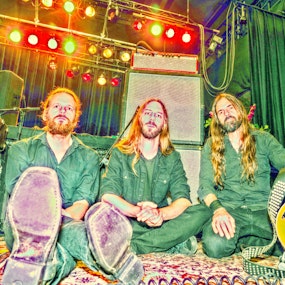
RRRAGS
Belgian dark psychedelic space rock band, RRRAGS, known for their raw energy and heavy live performances, RRRAGS has consistently impressed audiences with their unique blend of hard-driving sound, soulful vocals, rumbling instrumentation, and strong melodies. Comprising of guitarist Ron Van Herpen (Astrosoniq, Molasses, The Devil’s Blood), bassist Rob Zim (The Lords of Altamont) and singer/drummer Rob Martin (Bliksem), RRRAGS formed in September 2017 and made their explosive live debut at RoadBurn 2018. Since then, they have built a solid reputation through their jam-infused yet song-based live shows.
Featured Episodes
Here are some great episodes to get started with


















